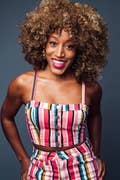FACT: Fashion and lifestyle magazines play a MAJOR role in what we buy and what and whom we discuss. Just think of that iconic Devil Wears Prada scene when Runway's editor-in-chief Miranda schools Andy on the industry's wide-reaching influence:
In the magazine world, the prestigious September issue is king so the cover star is really big deal! Historically, famous cisgender white women have been the go-to cover stars of choice. They've graced 74-percent of all September fashion covers in the past decade, according to a recent New York Times report.

This year, however, people are noticing a major shift: "All of these black women on these September covers! Whew! This would've never happened even 5 years ago. Amazing. Breaking barriers. I love us."

Rihanna became the first black woman to cover British Vogue's September issue in the magazine's 102-year history.

And while Beyoncé's American Vogue cover marked her second time on the fashion bible's September issue, she became the first-ever cover star to be photographed by a black photographer in the magazine's 125-year history.

Beyoncé called out these long-standing racial disparities in the cover story: "When I first started, 21 years ago, I was told that it was hard for me to get onto covers of magazines because black people did not sell," she told journalist Clover Hope. "Clearly that has been proven a myth."

Fans took to social media to celebrate this unprecedented wave of black cover stars flooding their timelines: "I'm finna cry seeing all of these beautiful black women on September issue covers! Growing up this was never how it was! Wow thinking of the kids growing up today- my heart!!!"

"All these black women on the covers of all these magazines for September is the most beautiful thing I've ever seen."

"About to make a trip to the store just to pick up every September magazine issue with a black female icon on the cover ✨✊🏾💅🏾"

Celebrities also joined in by shouting out their peers' groundbreaking dominance and basking in all of the awesome—albeit delayed—representation. On Instagram, Lena Waithe wrote, "We don’t just move the needle forward we are the needle."
Lebron James praised this seemingly-watershed moment while noting the significance of these covers for his daughters: "Nothing in this world is more POWERFUL than Colored Women!! Thank you all for continuing to not settle and setting great examples in life for so many looking up to you for inspiration/guidance and love!! My daughter is watching! #WomenPower💪🏾❤️👑."
And Janelle Monae kept it short but just as sweet, writing "Gimme all deeeeez . 👑🙌🏾 (Let’s buy y’all!)"
As the public conversation around these covers continues to grow, so do the nuanced takes. Twitter user @DanielleDASH brought up the importance of intersectional representation: "Im [sic] so happy about black women’s September and since both dark and light skin black women can see themselves I hope next September fat black women, queer black women and disabled black women will be represented on magazine covers too."

Meanwhile, @theblckgirlglow emphasized the need for representation not only on the magazines' covers, but also throughout the making of each issue and the entire industry: "Having black people at every level of a publication is what will allow black people to tell their stories honestly and to mass audiences."

Marjon Carlos penned a macro-level essay for Glamour, where she positioned this landmark influx against the backdrop of ongoing social injustices facing black women on the daily. "And while this shift in power and visibility is exciting, it also comes at a time when black female identity is at its most vulnerable," she wrote. "The unconscionable death of Nia Wilson last month and the glaring pay inequity black women face seem to suggest that as we continue to push culture along, we still remain uninsured by society at large."

"It's hard not to wonder what it means then to tout black women as ideals of luxury, influence, and beauty, but not carve out enough avenues to protect us from gross violence and poverty," Marjon continued. "Which is why the media—from cover stars to mastheads to creatives who conceive and produce content—becomes a significant tool to bring these unsettling and pervasive inequities to the forefront."
And finally without further ado, here are some of this year's groundbreaking September issue black cover stars. Here we have Naomi Campbell for ESSENCE.

Amanda Seales for Rolling Out.

Letitia Wright for W.

Imaan Hammam for Instyle.

Aja Naomi King for Shape.

Beyoncé for Vogue.


Tiffany Haddish for Glamour.

Lupita Nyong'o for Porter.


Oprah for O, The Magazine.

Rihanna for British Vogue.

Ruth Negga for Marie Claire UK.

Isse Rae for EBONY.

Slick Woods for Elle UK.

Tracee Ellis Ross for Elle Canada.

Yara Shahidi for The Hollywood Reporter.

Zendaya for Marie Claire.

Teyana Taylor for Playboy

